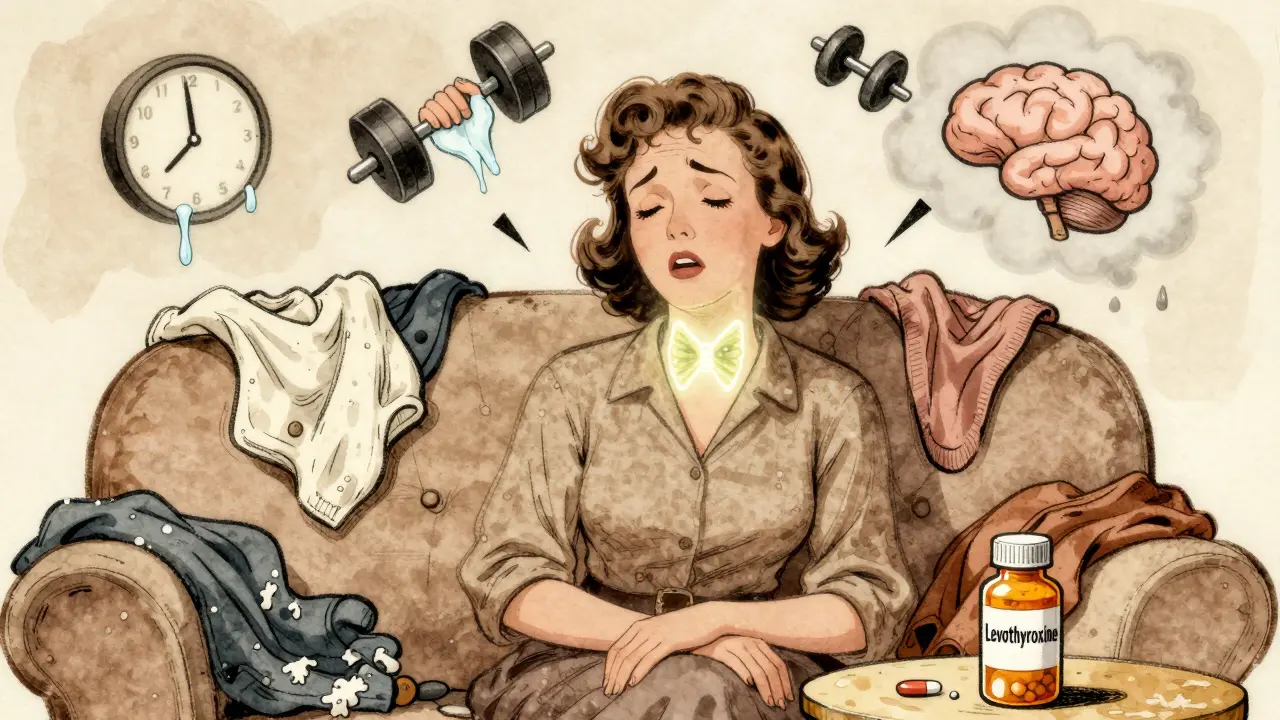Hypothyroidism is a chronic thyroid deficiency condition where the gland fails to produce enough thyroid hormones (T4 and T3), causing a slowdown of metabolism and a cascade of systemic symptoms.
When the thyroid slows down, many patients notice a subtle loss of strength. The sensation ranges from "my arms feel heavy" to genuine difficulty climbing stairs. This article untangles the biology, pinpoints the labs you’ll see, and offers actionable steps to restore muscle power.
Key Takeaways
- Low thyroid hormones directly impair muscle energy production.
- Common labs: high TSH, low free T4, elevated creatine kinase.
- Treatment options include levothyroxine, liothyronine, or natural desiccated thyroid.
- Addressing co‑factors like vitamin D, iron, and regular resistance training speeds recovery.
Why Thyroid Hormone Matters for Muscle
Thyroid hormone (primarily T3 and T4) acts like a thermostat for every cell. In muscle fibers, it drives mitochondrial biogenesis, glycogen storage, and protein turnover. When hormone levels drop, mitochondria produce less ATP, leading to fatigue and reduced contractile strength.
Researchers at the Endocrine Society reported that untreated hypothyroid patients have a 30% lower maximal oxygen uptake, a direct proxy for muscle endurance. The effect isn’t just “feeling tired”; it’s a measurable loss of physiological capacity.
Common Causes Linking Thyroid Deficiency to Weakness
Several pathways converge on muscle weakness:
- Primary hormone shortage: Insufficient T4/T3 limits cellular metabolism.
- Elevated thyroid‑stimulating hormone (TSH): While TSH itself isn’t toxic, chronic elevation signals the pituitary’s effort to compensate, often accompanying auto‑immune inflammation.
- Auto‑immune thyroiditis (Hashimoto’s): Hashimoto's thyroiditis destroys thyroid follicles, releasing inflammatory cytokines that can infiltrate muscle tissue.
- Secondary nutrient deficiencies: Vitamin D and iron deficiencies are common in hypothyroid patients and each independently cause myopathy.
- Medication side‑effects: Over‑replacement with levothyroxine can cause hyper‑thyroid‑like tremor and muscle cramps.
Diagnostic Blueprint
The work‑up starts with a simple blood panel, but a savvy clinician layers additional tests to rule out mimickers.
| Test | Normal Range | What an abnormal result indicates |
|---|---|---|
| TSH | 0.4‑4.0mIU/L | Elevated → primary hypothyroidism or under‑replacement |
| Free T4 | 0.8‑1.8ng/dL | Low → insufficient hormone production |
| Free T3 | 2.3‑4.2pg/mL | Low → conversion problem or severe deficiency |
| Creatine Kinase (CK) | 30‑200U/L | Elevated → muscle breakdown (myopathy) |
| Vitamin D (25‑OH) | 30‑100ng/mL | Low → contributes to weakness |
| Ferritin | 12‑300ng/mL (men) 12‑150ng/mL (women) | Low → iron‑deficiency anemia, worsens fatigue |
If thyroid antibodies (TPOAb, TgAb) are positive, Hashimoto’s is likely. In rare cases, clinicians order a muscle MRI or EMG to rule out inflammatory myopathies.
Treatment Arsenal
Restoring normal hormone levels is the cornerstone, but the approach isn’t one‑size‑fits‑all.
| Medication | Typical Dose (adult) | Half‑life | Onset of Symptom Relief | Common Side‑effects |
|---|---|---|---|---|
| Levothyroxine | 25‑200µg daily | ~7days | 2‑4weeks | Over‑dosage tremor, palpitations |
| Liothyronine | 5‑25µg daily | ~1day | Days to 1week | Rapid heart rate, anxiety |
| Natural Desiccated Thyroid (NDT) | 30‑120mg (1‑4 tablets) daily | Mixed (T4/T3) | 1‑3weeks | GI upset, occasional weight loss |
Most clinicians start with levothyroxine because of its stability and long half‑life. Patients who continue to feel weak despite normal TSH may benefit from adding liothyronine or switching to NDT, which provides both T4 and T3.

Adjunct Strategies to Accelerate Muscle Recovery
Hormone replacement fixes the root cause, but muscle health also depends on nutrition, micronutrients, and movement.
- Vitamin D repletion: Aim for serum 25‑OH > 40ng/mL. Supplement 2,000‑4,000IU daily for 8‑12 weeks.
- Iron optimization: If ferritin < 30ng/mL, add ferrous sulfate 325mg elemental iron twice daily with vitamin C.
- Protein intake: 1.2‑1.6g/kg body weight per day supports muscle protein synthesis.
- Resistance training: Two‑to‑three full‑body sessions per week (squats, rows, push‑ups) rebuild strength within 6‑8 weeks.
- Sleep hygiene: 7‑9hours of uninterrupted sleep enhances thyroid‑hormone conversion (T4 → T3).
When to Seek Specialist Care
If after 8‑12 weeks of optimized levothyroxine your TSH remains abnormal, or if CK stays >3× upper limit, refer to an endocrinologist. Persistent muscle pain, joint swelling, or rash could signal a secondary rheumatologic condition that needs separate treatment.
Common Pitfalls and How to Avoid Them
| Pitfall | Consequence | Correction |
|---|---|---|
| Self‑adjusting levothyroxine dose | Fluctuating TSH, heart palpitations | Follow physician‑ordered titration schedule |
| Ignoring vitamin D status | Persistent fatigue, bone loss | Check 25‑OH annually; supplement as needed |
| Skipping resistance training | Muscle atrophy despite normal labs | Incorporate progressive overload |
| Only checking TSH | Missing low T3 conversion issues | Order free T3 when symptoms persist |
Quick Reference Checklist
- ✅ Confirm elevated TSH + low free T4/T3.
- ✅ Order CK, vitamin D, ferritin.
- ✅ Initiate levothyroxine; re‑check TSH in 6‑8 weeks.
- ✅ Add liothyronine or NDT if T3 remains low.
- ✅ Address micronutrient gaps (vit D, iron).
- ✅ Begin light resistance training (2×week).
- ✅ Re‑evaluate symptoms and labs after 3months.
By tackling the hormone deficit, repairing nutritional shortfalls, and moving the body, most patients regain functional strength within 4‑6months. Remember, the goal isn’t just a "normal" TSH number; it’s getting back to the activities you love without feeling like your muscles are stuck in slow‑motion.
Frequently Asked Questions
Can hypothyroidism cause severe muscle loss?
Yes. Chronic low thyroid hormone reduces protein synthesis and mitochondrial function, leading to a slow, progressive loss of muscle mass known as "hypothyroid myopathy." Proper hormone replacement usually halts the decline and can reverse some loss over months.
Why is my TSH high but my CK is normal?
TSH reflects thyroid gland output, while CK measures muscle cell leakage. Early hypothyroidism often shows hormone changes before muscle damage becomes apparent. Treating the hormone imbalance early can prevent CK from rising.
Should I take both levothyroxine and liothyronine?
Combination therapy is considered when patients remain symptomatic despite a normal TSH on levothyroxine alone. Adding a low dose of liothyronine can improve T3 levels and relieve muscle fatigue, but it requires close monitoring for heart‑rate side‑effects.
Is Natural Desiccated Thyroid better for muscle strength?
NDT supplies a blend of T4 and T3, which some patients find restores energy faster. Clinical data are mixed, but anecdotal reports often cite improved stamina. Discuss risks and benefits with your endocrinologist before switching.
How long does it take to feel stronger after starting treatment?
Most people notice reduced fatigue within 2‑4weeks, but measurable gains in muscle strength typically appear after 8‑12weeks of stable hormone levels, combined with exercise and adequate nutrition.



Jason Oeltjen
If you aren't taking your thyroid meds exactly as presrcribed, you're basically playing Russian roulette with your muscles and ignoring the very real responsibility we have to keep our bodies in top shape.
Mark Vondrasek
Wow, another article trying to convince us that hormone replacement is the silver bullet for everything from fatigue to muscle atrophy, as if the pharmaceutical companies haven't been whispering sweet nothings into physicians' ears for decades.
Do you really think levothyroxine alone can fix a systemic issue when the whole endocrine axis is a tangled web of feedback loops that the industry keeps hidden?
And of course, they conveniently skip over the fact that so many patients report persistent weakness despite "perfect" TSH numbers, which is exactly the kind of data they suppress to keep the market churn flowing.
Meanwhile, the real culprits-environmental toxins, undisclosed dietary deficiencies, and the subtle influence of covert labs funding biased research-are swept under the rug.
People are told to trust your "quick reference checklist" while the underlying agenda is to push more prescriptions, more lab tests, and more profit.
Don't be fooled by the glossy tables; the half‑life of levothyroxine is a smokescreen for a much slower, more insidious buildup of metabolic imbalance.
And what about the folks who get their hands on natural desiccated thyroid, only to discover it's a wild west of variable hormone ratios, yet they're praised as pioneers for "listening to their bodies"?
It's all part of the grand design to keep us dependent, chasing the next tweak, the next supplement, the next miracle pill.
Sure, vitamin D and iron matter, but who decides the recommended daily allowances? The same committee that profits from selling millions of supplement bottles each year.
If you're truly skeptical, you might wonder why the article never mentions the alternative viewpoints from low‑dose naltrexone advocates or the emerging research on gut‑thyroid axis modulation.
In short, don't take this at face value; the "clinical guidelines" are a moving target designed to keep you guessing and, more importantly, buying.
Joshua Agabu
Sounds like a solid plan, just stick to the basics.
Matthew Bates
While the article provides a comprehensive overview, it is important to clarify that serum TSH elevation does not unequivocally indicate under‑replacement; assay variability and individual set‑points must be considered. Moreover, the claim that levothyroxine alone resolves muscle weakness overlooks the role of peripheral conversion efficiency, which can be impaired in patients with comorbidities such as anemia or chronic inflammation. Therefore, a thorough assessment of free T3 alongside TSH is warranted before dismissing combination therapy.
Kasey Mynatt
Great point, Joshua! Remember, consistency with medication and a gradual build‑up of resistance training can make the difference between feeling stuck and reclaiming your strength. Stay focused, and celebrate each small victory-it’s all part of the journey.
Edwin Pennock
Look, I get the grammar police vibe, but honestly, most patients don’t have the luxury to run endless labs just to prove a point. Sometimes the body just tells you it’s exhausted, and you have to adjust the meds, not get tangled in textbook perfection.
John McGuire
Hey everyone! 🙌 Remember, you’re not alone on this path-small steps like a 5‑minute walk or a protein‑rich snack can boost your recovery. Keep the momentum, and let’s smash those weakness barriers together! 🚀💪
newsscribbles kunle
Enough of this sugar‑coated nonsense! Our bodies are built for resilience, not for endless prescription churn. If you truly care about your health, stop pandering to pharmaceutical agendas and start respecting the natural power that resides within you.
aishwarya venu
Wow this is really helpful I feel hopeful about getting my strength back and I will definitely try the vitamin D and iron suggestions thanks for sharing
Nicole Koshen
Thanks for the thorough breakdown. I appreciate the balanced view on medication choices and the emphasis on lifestyle tweaks. It’s good to see both labs and real‑world practices addressed.
Ed Norton
Nice summary, helpful.